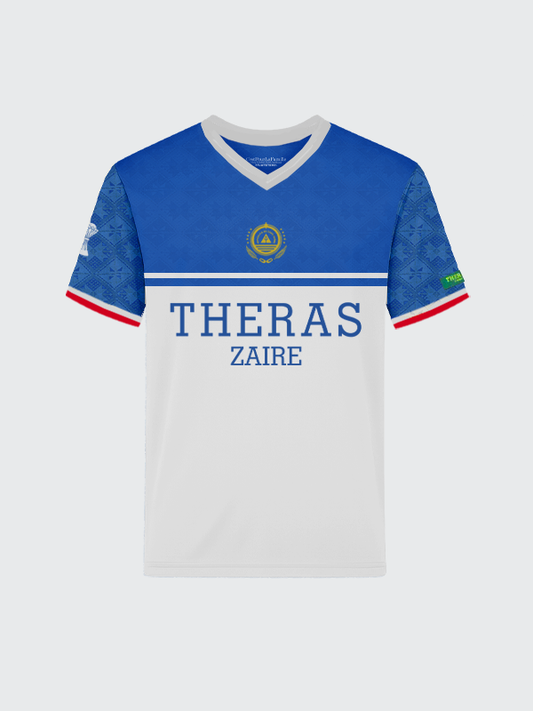𝐂𝐚𝐩𝐞 𝐕𝐞𝐫𝐝𝐞 𝐌𝐚𝐤𝐞𝐬 𝐇𝐢𝐬𝐭𝐨𝐫𝐲: Qualified for World Cup 2026
The dream has finally come true. The small Atlantic archipelago of Cape Verde has made history by qualifying for its first-ever FIFA World Cup. The Blue Sharks defeated Eswatini 3–0 in the final round of the African qualifiers, sealing their ticket to the 2026 World Cup, which will be held across the United States, Mexico, and Canada.
In a packed National Stadium in Praia, with over 15,000 fans, the nation erupted in joy. The government declared a national holiday, and the streets of every island filled with flags, music, and tears of pride. Their message to the world was clear:
“10 islands, one nation, one dream.”
 The Match That Changed Everything
The Match That Changed Everything
The decisive game began nervously. During the first half, Cape Verde dominated possession but struggled to break through Eswatini’s compact defense and the inspired saves of goalkeeper Khanyakwezwe Shabalala.
Everything shifted in the 48th minute, when Dailon Livramento, the 24-year-old forward from Casa Pia (Portugal), pounced on a rebound inside the box to make it 1–0. It was the moment the dream became real. Livramento, who had already scored the winning goal against Cameroon earlier in the qualifiers, once again became the national hero.
Just six minutes later, Willy Semedo doubled the lead after a brilliant combination play with Diney Borges and Yannick Semedo. And in stoppage time, veteran defender Stopira sealed the historic 3–0 victory.
When the referee blew the final whistle, Praia erupted. Fireworks lit the sky, players knelt in tears, and an entire nation celebrated the impossible: Cape Verde is going to the World Cup.
 Bubista: The Architect of a Dream
Bubista: The Architect of a Dream
The mastermind behind this achievement is Pedro Leitão Brito, better known as Bubista. A former international player himself, Bubista took over as head coach in 2020 and transformed a modest team into one of Africa’s most organized and united squads.
Understanding that local talent alone would not be enough, Bubista embraced the Cape Verdean diaspora, recruiting players with island heritage born or raised in Portugal, France, the Netherlands, Ireland, and England.
His tactical intelligence and emotional leadership forged a group that blends European technique with African spirit. Under his guidance, Cape Verde has remained undefeated throughout 2025, and now stands as one of the most disciplined and exciting teams on the continent.
The Heroes of Cape Verde’s Miracle
 🔹 Dailon Livramento – The Hero of Praia
🔹 Dailon Livramento – The Hero of Praia
At just 24, Dailon Livramento emerged as the undisputed hero of Cape Verde’s historic qualification. The Casa Pia striker has impressed not only with his finishing but with his remarkable instinct, agility, and composure under pressure. His decisive goal against Eswatini was a textbook example of a forward reading the game perfectly, capitalizing on a rebound to spark celebrations across the archipelago. Livramento’s ability to create space, make intelligent runs, and finish clinically has made him a rising star, and he now carries the weight of national expectation as the team heads to its first World Cup.
 🔹 Steven Moreira – The Defensive Anchor
🔹 Steven Moreira – The Defensive Anchor
Steven Moreira, defender for Columbus Crew (MLS, USA), has been a pillar of consistency for the Blue Sharks. His calmness under pressure, precise positioning, and leadership on the field have anchored Cape Verde’s back line throughout the qualifiers. Moreira’s experience in international club football allows him to organize the defense, anticipate threats, and neutralize danger, providing a sense of stability that is invaluable for a debutant squad heading to the World Cup.
 🔹 Jamiro Monteiro – The Engine in Midfield
🔹 Jamiro Monteiro – The Engine in Midfield
Jamiro Monteiro, the creative midfielder from San Jose Earthquakes (MLS), is the engine that drives Cape Verde’s play. Tireless, technical, and intelligent, Monteiro dictates tempo, links defense with attack, and opens spaces for the forwards. His vision and ball control were pivotal in unlocking Eswatini’s defense, and his work rate off the ball exemplifies the discipline and unity that Bubista has instilled in this squad. Monteiro is not just a playmaker; he is the heartbeat of the Blue Sharks.
 🔹 Stopira – The Veteran Finisher
🔹 Stopira – The Veteran Finisher
Veteran defender Stopira, who plies his trade at Fehérvár FC (Hungary), combines experience, composure, and timing. One of the longest-serving players in Cape Verde’s history, he has been a mentor to younger teammates and a stabilizing presence in crucial moments. His stoppage-time goal against Eswatini, sealing the 3-0 victory, was the perfect culmination of a career built on dedication and leadership—a fitting reward for his service to the national team.
 🔹 Roberto “Pico” Lopes – The Diaspora Discovery
🔹 Roberto “Pico” Lopes – The Diaspora Discovery
Roberto Lopes, born in Dublin, Ireland, embodies the modern Cape Verdean strategy of harnessing diaspora talent. Famously discovered through LinkedIn in 2019, Lopes initially thought the message was spam. Yet, six years later, he has become an essential component of the squad, offering versatility, defensive intelligence, and a calm presence under pressure.
“I didn’t even speak Portuguese and thought it was a scam. But that message changed my life,” Lopes recalled, reflecting on a journey that bridges continents and generations.
 🔹 Nuno da Costa & Kevin Pina – The International Core
🔹 Nuno da Costa & Kevin Pina – The International Core
Nuno da Costa (İstanbul Başakşehir, Turkey) and Kevin Pina (Krasnodar, Russia) provide Cape Verde with international experience and balance. Da Costa’s pace, tactical awareness, and finishing ability complement Pina’s control, distribution, and ability to break up opposition attacks. Together, they stabilize the spine of the team, allowing the Blue Sharks to compete with confidence against Africa’s elite.
A Small Nation with a Giant Heart
With just 525,000 inhabitants and 10 main islands, Cape Verde becomes the second smallest country by population to ever play in a World Cup—after Iceland in 2018. It is also the smallest by land area, with only 4,000 square kilometers.
The timing couldn’t be more symbolic: the qualification coincides with the 50th anniversary of Cape Verde’s independence from Portugal (1975–2025). The celebrations spanned Praia, Mindelo, and the global Cape Verdean diaspora in Lisbon, Rotterdam, Boston, and Paris.
 The Power of the Diaspora
The Power of the Diaspora
Cape Verde’s success story is not a fairy tale—it’s a masterclass in strategic development and unity.
Realizing its small population limited the local player pool, the Cape Verdean Football Federation began reaching out to players of Cape Verdean descent abroad. The diaspora responded.
Today, the Blue Sharks are a living symbol of global identity: a national team built by family ties, culture, and pride rather than borders. It’s a model that other small nations could follow to compete at the world stage.
 Looking Ahead: The Future of Cape Verdean Football
Looking Ahead: The Future of Cape Verdean Football
Cape Verde’s qualification is not the end of a journey—it’s the beginning of a new era. With strong youth programs, growing infrastructure, and a global scouting network, the nation has built a foundation for long-term success.
If Bubista and his players can maintain the same unity and discipline, Cape Verde could become one of Africa’s new rising powers—a team capable not just of competing, but of surprising at the 2026 World Cup.
Cape Verde has proven that greatness is not measured by size.
With heart, belief, and unity, ten islands have conquered the world of football.





